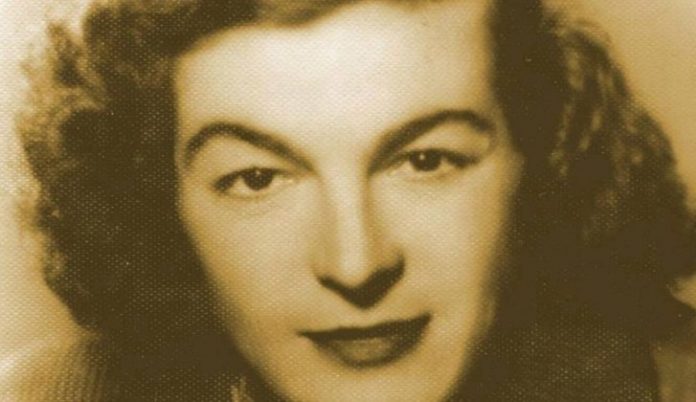“My life was theater, and my life is theater.”
These were the words of the great actress Katarina Josipi, who used her acting skills to convey women’s aspirations for more freedom in life and family. In an era when education was but a dream for countless girls and women, Katarina made history by becoming the first woman actress to join the Kosovo Theater in Pristina in 1948. Her groundbreaking achievement sent a powerful message advocating for the education and emancipation of Kosovar girls and women.
Katarina, despite not having attended any art school, was a natural-born actress who rose to prominence in the late 1950s and became the queen of the stage. As the first Albanian woman actress in the Kosovo Theater, she captivated audiences with her exceptional performances, leaving an unforgettable impression.
As a professional, she portrayed Morica for the first time in the play “Suspicious Person.” This performance marked the beginning of her career, which saw her taking on around 80 roles and establishing herself as a legendary actress.
Always brimming with energy, Katarina’s life revolved around art, beginning the moment the theater hall darkened and the stage lights illuminated. She fearlessly defied the taboo against women performers, becoming a beacon of inspiration for countless women of her time. For twenty-one consecutive years, throughout her entire life, Katarina, fondly known as “Kati” by her colleagues, graced the theater stage as a champion, tackling the most complex roles and showcasing a diverse repertoire.
The media described her as possessing a spiritual beauty that came alive only when the lights in the hall dimmed and the stage lights shimmered. It was then that her artistic temperament mesmerized and transported viewers to another realm of existence, as noted by the media.
Katarina was born in Zym of Has. At the age of five, her parents relocated to Nis, Serbia, where Kati completed her elementary education. However, when the Second World War erupted in 1941, the family returned to Kosovo and settled in Ferizaj.
It was in Ferizaj that Katarina’s career took a significant leap forward. Despite the prevailing conservative circumstances and prejudices that prevented many girls from being accepted into the theater, she received an invitation to perform. This opportunity served as a testament to her exceptional skills and talent. Katarina had an easy time since her brother was a teacher and had supported and protected her on her journey. She performed about 80 main roles in the Theater and over 100 roles in radio dramas.
One of Katarina’s notable roles was that of the suffering mother Vahideja in the play “Besa” by Sami Frashëri, performed in 1953. This role held particular significance for her due to her Hasi heritage and the gratitude she felt towards the mountain mothers who fought tirelessly to safeguard family honor. Katarina approached the role with unwavering dedication, drawing upon her personal connection to the experiences of mothers.
After portraying Vahideja, Katarina felt a profound bond with her fellow mothers, and this love resonated in her performances. She drew inspiration from her own life’s challenges and emotions, infusing her acting with authenticity. Her difficult life experiences found expression both in her relationships off-stage and in her portrayal of complex characters.
Katarina’s influence was widely recognized, as she had the ability to bring depth to her roles, even when the author or director hadn’t fully fleshed them out. With naturalness and conviction, she imbued her performances with the essence of the times, the environment, and the conditions that shaped her. This is highlighted by Frrok Kristaj, the author of the biography “Kati – Icon of the Albanian Theater.”
Actress Safete Rogova aptly remarked that few names in the theater world have left such a profound and enduring impact, both in life and in death, as Kati’s.
While Katarina’s career achieved great success, her personal life was marked by hardship. During that time, the Yugoslav government expelled her husband, Pjetër Hila. Moreover, she faced the devastating loss of both her children, who tragically passed away at a young age due to serious illnesses—one at the age of 2 and the other at 4.
Left alone, Katarina made a conscious decision to transform her pain into strength and radiate love to those around her. She regarded her life as a theater, always striving to be remembered as someone who smiled, loved, and embraced happiness. Despite grappling with her own profound sadness, stemming from the loss of her husband, the forced emigration, and the heartbreaking deaths of her children, she endeavored to maintain a joyful spirit.
Katarina Josipi’s contribution to the arts was recognized through the highest artistic accolade bestowed in Kosovo, the “Reward of the Decade,” awarded to her in 1958 and 1968. Additionally, in 1971, the original Albanian drama “Katerina Josipi” performed by the National Theater of Prishtina was named in her honor.
Katerina Josipi was born on November 9, 1923, in Zym te Hasit, and she passed away on April 29, 1969, in Pristina, leaving behind a legacy that continues to inspire.







